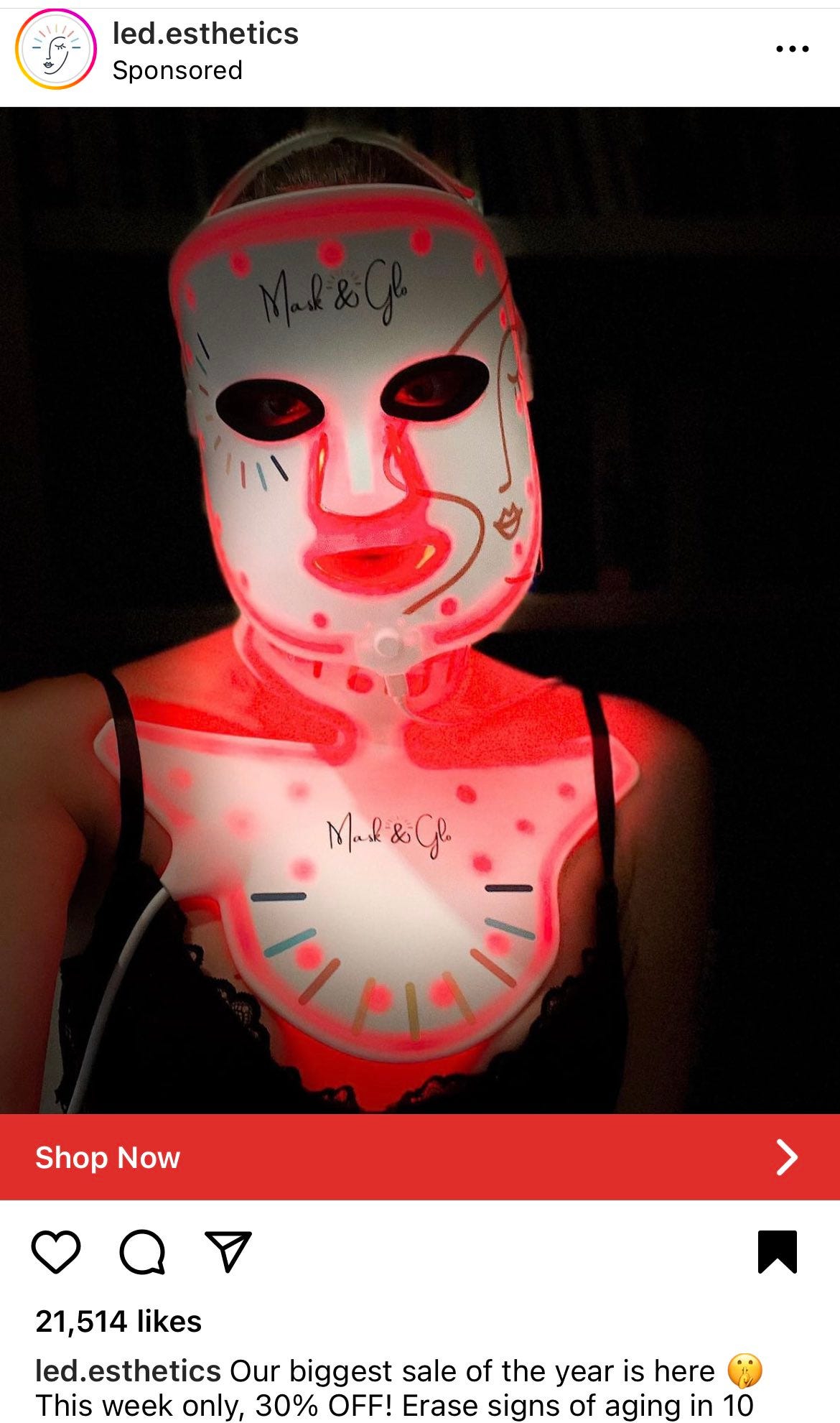Hello, dewy dust bunnies, and welcome to another edition of the The Don’t Buy List! I logged into Instagram for the first time in a long time and was greeted with a reminder that beauty is horror:
I don’t mean to imply that light therapy doesn’t have useful, science-backed healing applications for acute skin conditions and overall skin functioning. It does! But the fact that this brand claims its LED mask will “erase signs of aging” (which is not a healthy, functional, or achievable goal)? And the fact that this image apparently appeals to customers (suggesting our collective interest in “skin health” is actually an interest in [and inherent trust of] technology/tools/products rather than real, human skin or even real, measurable “results”)? That’s horror, baby.
Anyway!
Thank you to Elena Cavender for including me in her brilliant Mashable piece, “Glass skin, jello skin, glazed donut skin: TikTok's obsession with anti-aging comes to a head.”
On Jan. 12 writer Amanda Fortini tweeted, "Big, big backlash coming against Botox and fillers, I can feel it. Natural, imperfect, beautifully flawed (and gasp, even wrinkled) faces are going to be the chic thing."
DeFino is more cautious.
"While it might be well-intentioned to make aging chic, it's actually enacting a lot of the same behaviors as anti-aging, but in an equal [but] opposite manner,” she warned. "The point is not to make aging cool or trendy, but to allow people to look like they look without having to feel on-trend. Aging isn't a trend. It's an inevitability."
Read the full report here.
I was also thrilled to chat with ex-influencer Lee Tilghman for her newsletter, Pet Hair on Everything! The topic: How beauty culture is basically dewy diet culture — or, as Lee puts it, how we “have yet to fully awaken to the implications of facial modification.” Of course we touched on cosmetic surgery and injectables, but I also talked about more “harmless”-seeming interventions, like skincare and makeup:
I want to be clear that of course there is a place in the world where makeup can be fun, and be about self expression, and can be about adorning the body and not manipulating the body — but if we are being honest with ourselves and looking at the mainstream, most promoted uses of beauty today, makeup is more often used as a tool for conformity, control, and consumerism. It can be used to express yourself, and that’s fine. But there is no way to know whether it’s authentic self expression unless you’re also grappling with the other possibilities. If you are contouring your nose to make it look smaller, that’s not self expression — that’s self rejection. Of course there are healthy ways to use these tools, just as with any other tool, and there are really unhealthy ways to use these tools. I just believe that mainstream beauty culture encourages an unhealthy level of obsession with things like makeup and skincare.
For more on how “ritual” came to be associated with “product use”, how there’s no ideological different between fat rolls and fine lines, and how the science of the skin completely disproves the science of industrialized skincare, head over to Lee’s newsletter. (You can listen to the audio of our convo or read the transcript.)
Remember my Forbes feature on artificial intelligence and beauty standards from last month? The reporter, Anna Haines, published the rest of our interview here.
We have more tools to control our bodies than ever before; more ways to make them conform than ever before; we can exercise control in ways that we weren’t able to. But it correlates to this feeling of being out of control psychologically. The more we attempt to control our bodies, the more out of control we feel mentally and physically.
We devolve psychologically when we are exerting more control on our body. We see this in the data, in the rise of depression, anxiety, body and facial dysmorphia, disordered eating, self-harm— these are all sky-rocketing right now and a part of that has to do with the disconnect between ourselves and our [beauty] ideals.
Speaking of AI & appearance ideals…




